Muchirigathiru1
On this page, you find all documents, package deals, and flashcards offered by seller muchirigathiru1.
- 2716
- 0
- 0
Community
- Followers
- Following
2716 items
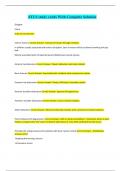
ATLS study cards With Complete Solution
Glasgow Coma Scale Correct Answer- Chance fracture Correct Answer- Transverse fracture through vertebra. In children usually associated with enterc disruption. Seen in motor vehicle accidents involving only lap belt. May be associated with retroperitoneal and Abdominal visceral injuries. Anterior hip dislocation Correct Answer- Flexed, abducted, externally rotated. Burst fracture Correct Answer- Associated with vertebral-axial compression injuries Posterior hip dislocation Correct Answe...
- Exam (elaborations)
- • 29 pages •
Glasgow Coma Scale Correct Answer- Chance fracture Correct Answer- Transverse fracture through vertebra. In children usually associated with enterc disruption. Seen in motor vehicle accidents involving only lap belt. May be associated with retroperitoneal and Abdominal visceral injuries. Anterior hip dislocation Correct Answer- Flexed, abducted, externally rotated. Burst fracture Correct Answer- Associated with vertebral-axial compression injuries Posterior hip dislocation Correct Answe...
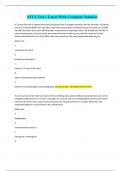
ATLS Test 1 Latest With Complete Solution
A 22-year-old man is hypotensive and tachycardic after a shotgun wound to the left shoulder. His blood pressure is initially 80/40 mm Hg. After initial fluid resuscitation his blood pressure increases to 122/84 mm Hg. His heart rate is now 100 beats per minute and his respiratory rate is 28 breaths per minute. A tube thoracostomy is performed for decreased left chest breath sounds with the return of a small amount of blood and no air leak. After chest tube insertion, the most appropriate nex...
- Exam (elaborations)
- • 22 pages •
A 22-year-old man is hypotensive and tachycardic after a shotgun wound to the left shoulder. His blood pressure is initially 80/40 mm Hg. After initial fluid resuscitation his blood pressure increases to 122/84 mm Hg. His heart rate is now 100 beats per minute and his respiratory rate is 28 breaths per minute. A tube thoracostomy is performed for decreased left chest breath sounds with the return of a small amount of blood and no air leak. After chest tube insertion, the most appropriate nex...
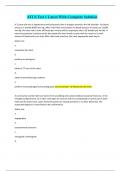
ATLS Test 1 Latest With Complete Solution
A 22-year-old man is hypotensive and tachycardic after a shotgun wound to the left shoulder. His blood pressure is initially 80/40 mm Hg. After initial fluid resuscitation his blood pressure increases to 122/84 mm Hg. His heart rate is now 100 beats per minute and his respiratory rate is 28 breaths per minute. A tube thoracostomy is performed for decreased left chest breath sounds with the return of a small amount of blood and no air leak. After chest tube insertion, the most appropriate nex...
- Exam (elaborations)
- • 22 pages •
A 22-year-old man is hypotensive and tachycardic after a shotgun wound to the left shoulder. His blood pressure is initially 80/40 mm Hg. After initial fluid resuscitation his blood pressure increases to 122/84 mm Hg. His heart rate is now 100 beats per minute and his respiratory rate is 28 breaths per minute. A tube thoracostomy is performed for decreased left chest breath sounds with the return of a small amount of blood and no air leak. After chest tube insertion, the most appropriate nex...
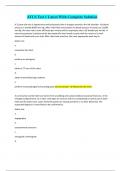
ATLS Test 1 Latest With Complete Solution
A 22-year-old man is hypotensive and tachycardic after a shotgun wound to the left shoulder. His blood pressure is initially 80/40 mm Hg. After initial fluid resuscitation his blood pressure increases to 122/84 mm Hg. His heart rate is now 100 beats per minute and his respiratory rate is 28 breaths per minute. A tube thoracostomy is performed for decreased left chest breath sounds with the return of a small amount of blood and no air leak. After chest tube insertion, the most appropriate nex...
- Exam (elaborations)
- • 22 pages •
A 22-year-old man is hypotensive and tachycardic after a shotgun wound to the left shoulder. His blood pressure is initially 80/40 mm Hg. After initial fluid resuscitation his blood pressure increases to 122/84 mm Hg. His heart rate is now 100 beats per minute and his respiratory rate is 28 breaths per minute. A tube thoracostomy is performed for decreased left chest breath sounds with the return of a small amount of blood and no air leak. After chest tube insertion, the most appropriate nex...
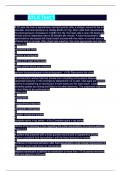
ATLS Test 1
A 22-year-old man is hypotensive and tachycardic after a shotgun wound to the left shoulder. His blood pressure is initially 80/40 mm Hg. After initial fluid resuscitation his blood pressure increases to 122/84 mm Hg. His heart rate is now 100 beats per minute and his respiratory rate is 28 breaths per minute. A tube thoracostomy is performed for decreased left chest breath sounds with the return of a small amount of blood and no air leak. After chest tube insertion, the most appropriate ne...
- Exam (elaborations)
- • 14 pages •
A 22-year-old man is hypotensive and tachycardic after a shotgun wound to the left shoulder. His blood pressure is initially 80/40 mm Hg. After initial fluid resuscitation his blood pressure increases to 122/84 mm Hg. His heart rate is now 100 beats per minute and his respiratory rate is 28 breaths per minute. A tube thoracostomy is performed for decreased left chest breath sounds with the return of a small amount of blood and no air leak. After chest tube insertion, the most appropriate ne...
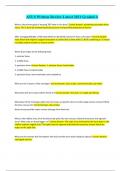
ATLS Written Review Latest 2021 Graded A
What is the primary goal of treating TBI? How is this done? Correct Answer- preventing secondary brain injury. This is done by maintaining blood pressure and providing adequate profusion. After managing ABCDEs of TBI what MUST be identified if present? How is this done? Correct Answer- mass lesion that requires surgical evacuation is critical! this is done with CT. NOTE: obtaining a CT should not delay patient transfer to trauma center. Which brain lobes do the following hold: 1. anterior ...
- Exam (elaborations)
- • 16 pages •
What is the primary goal of treating TBI? How is this done? Correct Answer- preventing secondary brain injury. This is done by maintaining blood pressure and providing adequate profusion. After managing ABCDEs of TBI what MUST be identified if present? How is this done? Correct Answer- mass lesion that requires surgical evacuation is critical! this is done with CT. NOTE: obtaining a CT should not delay patient transfer to trauma center. Which brain lobes do the following hold: 1. anterior ...
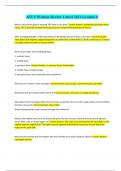
LS Written Review Latest 2021 Graded A
What is the primary goal of treating TBI? How is this done? Correct Answer- preventing secondary brain injury. This is done by maintaining blood pressure and providing adequate profusion. After managing ABCDEs of TBI what MUST be identified if present? How is this done? Correct Answer- mass lesion that requires surgical evacuation is critical! this is done with CT. NOTE: obtaining a CT should not delay patient transfer to trauma center. Which brain lobes do the following hold: 1. anterior ...
- Exam (elaborations)
- • 16 pages •
What is the primary goal of treating TBI? How is this done? Correct Answer- preventing secondary brain injury. This is done by maintaining blood pressure and providing adequate profusion. After managing ABCDEs of TBI what MUST be identified if present? How is this done? Correct Answer- mass lesion that requires surgical evacuation is critical! this is done with CT. NOTE: obtaining a CT should not delay patient transfer to trauma center. Which brain lobes do the following hold: 1. anterior ...
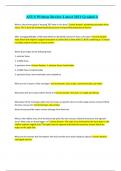
ATLS Written Review Latest 2021 Graded A
What is the primary goal of treating TBI? How is this done? Correct Answer- preventing secondary brain injury. This is done by maintaining blood pressure and providing adequate profusion. After managing ABCDEs of TBI what MUST be identified if present? How is this done? Correct Answer- mass lesion that requires surgical evacuation is critical! this is done with CT. NOTE: obtaining a CT should not delay patient transfer to trauma center. Which brain lobes do the following hold: 1. anterior ...
- Exam (elaborations)
- • 16 pages •
What is the primary goal of treating TBI? How is this done? Correct Answer- preventing secondary brain injury. This is done by maintaining blood pressure and providing adequate profusion. After managing ABCDEs of TBI what MUST be identified if present? How is this done? Correct Answer- mass lesion that requires surgical evacuation is critical! this is done with CT. NOTE: obtaining a CT should not delay patient transfer to trauma center. Which brain lobes do the following hold: 1. anterior ...
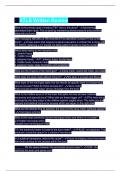
ATLS Written Review
What is the primary goal of treating TBI? How is this done? - preventing secondary brain injury. This is done by maintaining blood pressure and providing adequate profusion. After managing ABCDEs of TBI what MUST be identified if present? How is this done? - mass lesion that requires surgical evacuation is critical! this is done with CT. NOTE: obtaining a CT should not delay patient transfer to trauma center. Which brain lobes do the following hold: 1. anterior fossa: 2. middle fossa: 3...
- Exam (elaborations)
- • 12 pages •
What is the primary goal of treating TBI? How is this done? - preventing secondary brain injury. This is done by maintaining blood pressure and providing adequate profusion. After managing ABCDEs of TBI what MUST be identified if present? How is this done? - mass lesion that requires surgical evacuation is critical! this is done with CT. NOTE: obtaining a CT should not delay patient transfer to trauma center. Which brain lobes do the following hold: 1. anterior fossa: 2. middle fossa: 3...
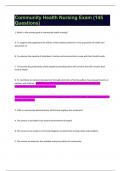
Community Health Nursing Exam (145 Questions)
1. Which is the primary goal of community health nursing? A. To support and supplement the efforts of the medical profession in the promotion of health and prevention of B. To enhance the capacity of individuals, families and communities to cope with their health needs C. To increase the productivity of the people by providing them with services that will increase their level of health D. To contribute to national development through promotion of family welfare, focusing particularly on m...
- Exam (elaborations)
- • 66 pages •
1. Which is the primary goal of community health nursing? A. To support and supplement the efforts of the medical profession in the promotion of health and prevention of B. To enhance the capacity of individuals, families and communities to cope with their health needs C. To increase the productivity of the people by providing them with services that will increase their level of health D. To contribute to national development through promotion of family welfare, focusing particularly on m...
